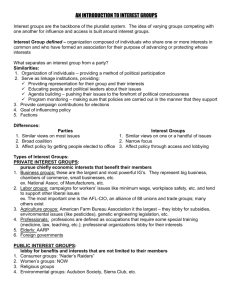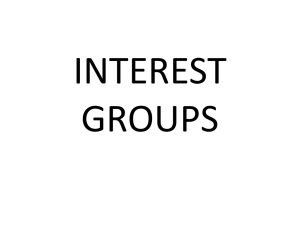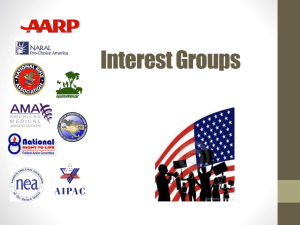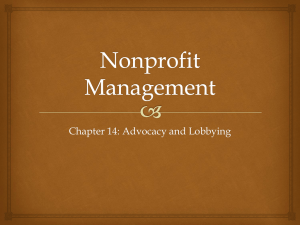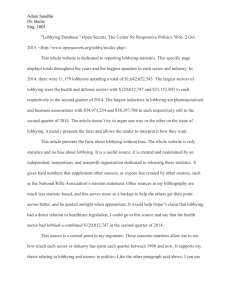Regulation of Influence and Advocacy description
advertisement
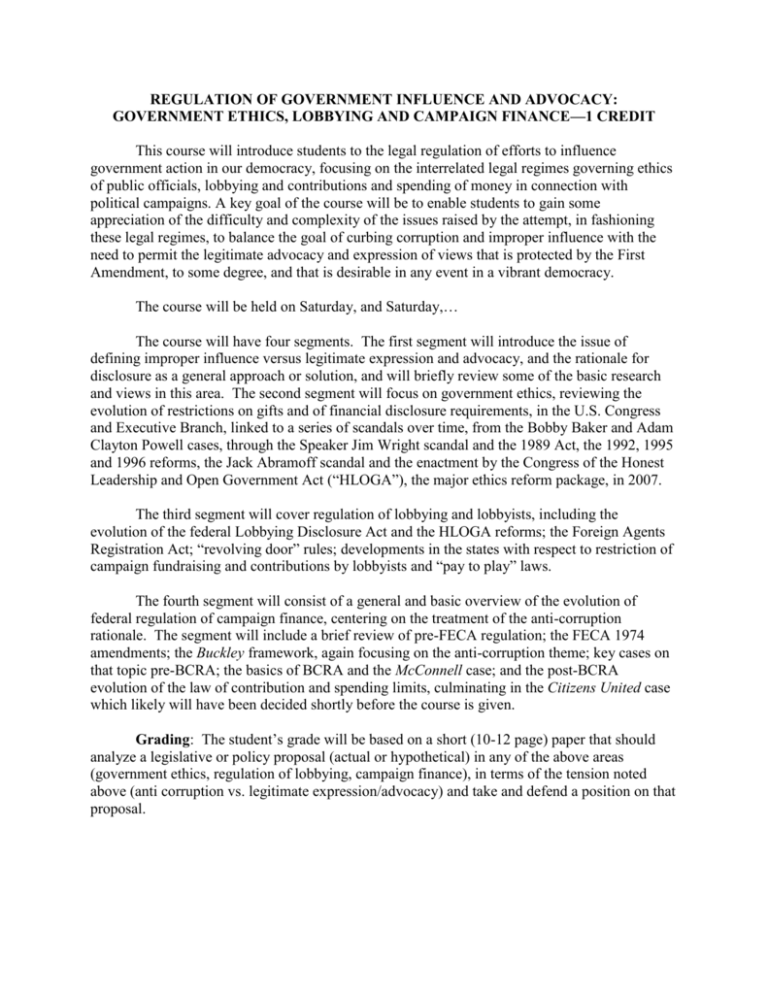
REGULATION OF GOVERNMENT INFLUENCE AND ADVOCACY: GOVERNMENT ETHICS, LOBBYING AND CAMPAIGN FINANCE—1 CREDIT This course will introduce students to the legal regulation of efforts to influence government action in our democracy, focusing on the interrelated legal regimes governing ethics of public officials, lobbying and contributions and spending of money in connection with political campaigns. A key goal of the course will be to enable students to gain some appreciation of the difficulty and complexity of the issues raised by the attempt, in fashioning these legal regimes, to balance the goal of curbing corruption and improper influence with the need to permit the legitimate advocacy and expression of views that is protected by the First Amendment, to some degree, and that is desirable in any event in a vibrant democracy. The course will be held on Saturday, and Saturday,… The course will have four segments. The first segment will introduce the issue of defining improper influence versus legitimate expression and advocacy, and the rationale for disclosure as a general approach or solution, and will briefly review some of the basic research and views in this area. The second segment will focus on government ethics, reviewing the evolution of restrictions on gifts and of financial disclosure requirements, in the U.S. Congress and Executive Branch, linked to a series of scandals over time, from the Bobby Baker and Adam Clayton Powell cases, through the Speaker Jim Wright scandal and the 1989 Act, the 1992, 1995 and 1996 reforms, the Jack Abramoff scandal and the enactment by the Congress of the Honest Leadership and Open Government Act (“HLOGA”), the major ethics reform package, in 2007. The third segment will cover regulation of lobbying and lobbyists, including the evolution of the federal Lobbying Disclosure Act and the HLOGA reforms; the Foreign Agents Registration Act; “revolving door” rules; developments in the states with respect to restriction of campaign fundraising and contributions by lobbyists and “pay to play” laws. The fourth segment will consist of a general and basic overview of the evolution of federal regulation of campaign finance, centering on the treatment of the anti-corruption rationale. The segment will include a brief review of pre-FECA regulation; the FECA 1974 amendments; the Buckley framework, again focusing on the anti-corruption theme; key cases on that topic pre-BCRA; the basics of BCRA and the McConnell case; and the post-BCRA evolution of the law of contribution and spending limits, culminating in the Citizens United case which likely will have been decided shortly before the course is given. Grading: The student’s grade will be based on a short (10-12 page) paper that should analyze a legislative or policy proposal (actual or hypothetical) in any of the above areas (government ethics, regulation of lobbying, campaign finance), in terms of the tension noted above (anti corruption vs. legitimate expression/advocacy) and take and defend a position on that proposal. Schedule/Reading Assignments Session 1 Introduction: The Perennial Problem: Improper Influence vs. Legitimate Advocacy & Political Expression --Does money buy access/ influence? both? neither? --How big a problem is the “appearance” of corruption or improper influence vs. the reality? --To what extent does disclosure solve these problems? Readings: Lowenstein, Hasen & Tokaji, “Empirical Observations about and Theoretical Justifications for, Campaign Finance Regulation,” ELECTION LAW: CASES & MATERIALS 713-23 (4th Ed. 2008) Gary C. Jacobson, THE POLITICS OF CONGRESSIONAL ELECTIONS (excerpts) (6th ed. 2004) J Samples, “The Corruption of Representation,” Chapter 3 in THE FALLACY OF CAMPAIGN FINANCE REFORM (2006) R. Kaiser, SO DAMN MUCH MONEY: THE TRIUMPH OF LOBBYING AND THE CORROSION OF AMERICAN GOVERNMENT Chapters 1, 2, 5, 6 & 20 (2008) Session 2 Bribery and other legal theories (honest services, etc.)-- elements Evolution of restrictions on public officials and financial disclosure requirements: the cycle of scandal and legislative reaction; ever-tightening restrictions Early codes; Baker; Powell; Wright; 1978 Ethics in Government Act; Ethics Reform Act of 1989; Reforms in 1992, 1995 and 1996; Abramoff; Honest Leadership and Open Government Act 2007 Executive Branch ethics rules overview (gifts, outside income) Readings: Report of House Bipartisan Task Force on Ethics, 101st Cong., 1st Sess. (1989)(excerpts) Report of the Ethics Reform Task Force on H. Res. 168, 105th Cong., 1st Sess. (1997)(excerpts) Indictments, U.S. v. Abramoff; U.S. v. Ney U.S. House Ethics Manual 1-7, 23-35, 79-82, 185-96 (2008 ed) ABA Lobbying Manual, Chapters 1, 2, 23 (excerpts) and 24 (4th Ed.) US Senate Financial Disclosure Report Form & Instructions (current version) 2 Session 3 Regulation of lobbying and lobbyists: Evolution of federal lobbying disclosure laws; Federal Regulation of Lobbying Act; Lobbying Disclosure Act of 1995; Byrd Amendment; HLOGA 2007 Basic goals of and legal framework of federal lobbying disclosure; key features of HLOGA Foreign Agents Registration Act—brief history and overview “Revolving door” rules—restrictions on government officials who become lobbyists Obama Administration lobbying restrictions Developments in the states; bans and restrictions on political and campaign activity by lobbyists; Rule G37; “pay to play” laws Readings: United States v. Harriss ABA Lobbying Manual, Chapters 1, 2, 3 (excerpts), 4, 12 (excerpts), 15 (excerpts), 36 (4th ed) Session 4 Campaign finance regulation: evolution of the current federal regime and expression of the anti-corruption rationale; Watergate & FECA amendments of 1974; the Buckley constitutional framework; basic statutory framework and implementation 1980-2000; the 199697 campaign finance controversies; BCRA; Supreme Court jurisprudence post-BCRA contribution & spending limits; individual vs. corporate/union independent spending Readings: Hasen, Lowenstein & Tokaji, Election Law: Cases & Materials Chapter 14 (I & II); Chapter 15 (II & III); Chapter 16 (II & III) Final Report of US Senate Comm. on Governmental Affairs, Investigation of Illegal or Improper Activities in Connection with 1996 Federal Election Campaigns, S. Rep. 105-167, 105th Cong., 2d. Sess. 31-50, 4459-4502, 4661-4776 (1998) Thomas Mann, “The Rise of Soft Money,” pp. 17-39 in Corrado, Mann & Potter, INSIDE THE CAMPAIGN FINANCE BATTLE: COURT TESTIMONY ON THE NEW REFORMS (2003) FEC v. Mass. Citizens for Life McConnell v. FEC (excerpts) Citizens United v. FEC 3


